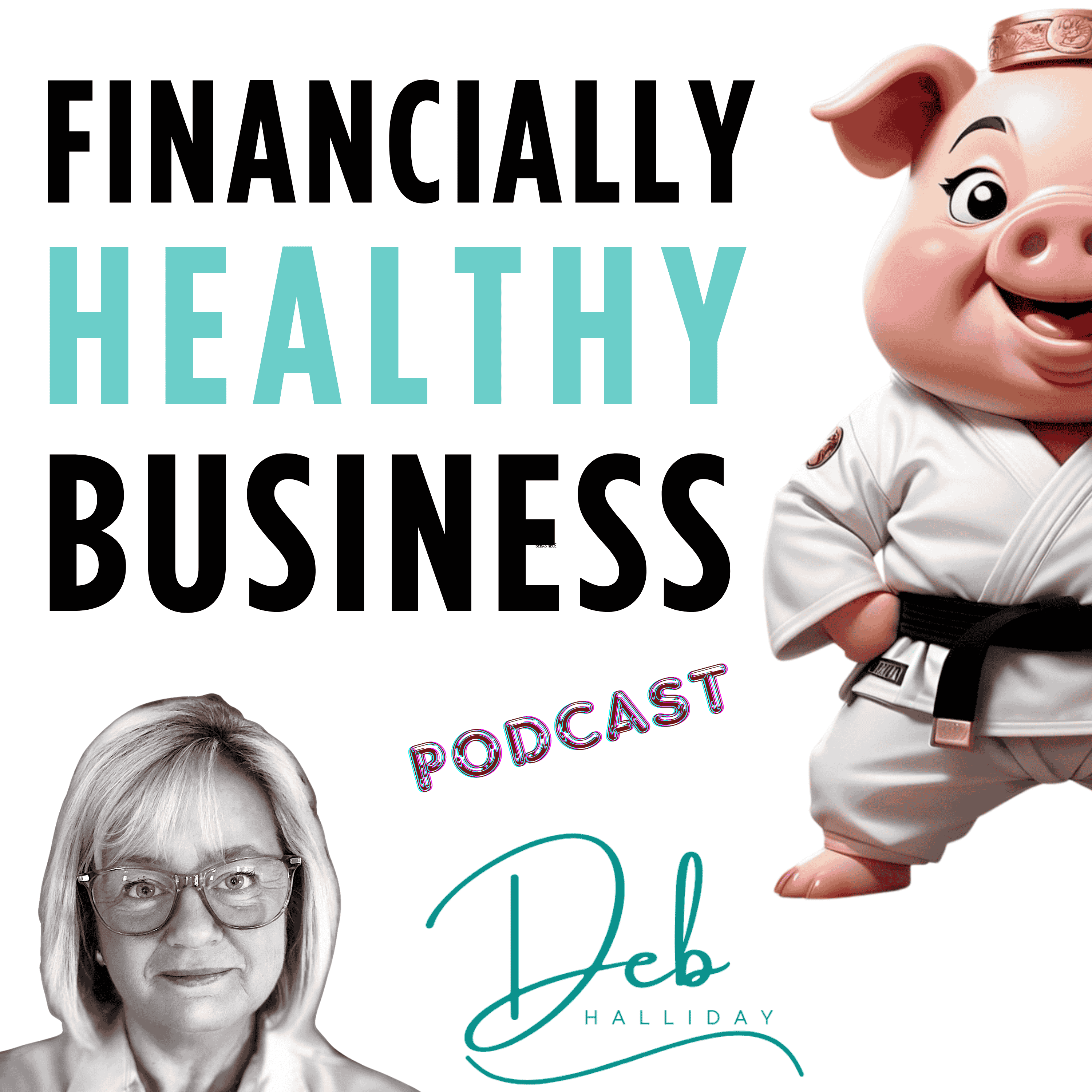The Importance of Defining Your Business Endgame
Podcast Episode Description:
In this episode, we ask one of the most important questions every business owner must eventually face: Where is your business heading?
I’m Deb, a Profit First Professional, and I’m here to help you explore the three core paths available to you as an entrepreneur—whether to stick with what’s working, scale for greater income and impact, or sell and move on to something new.
Clarity on your business direction shapes how you spend your time, energy, and money. And those who lead with clarity make stronger decisions, feel more in control, and build businesses that truly support the life they want.
You’ll hear stories from my own journey, along with key reflection questions to help you assess what you really want—and how to start building towards it today.
About the Podcast:
This episode of the Financially Healthy Business Podcast explores the critical difference between business owners who feel empowered—and those who feel stuck. That difference often comes down to one thing: clarity of direction.
I walk you through three strategic options:
✔️ Stick – maintain and optimise your current business model
📈 Scale – grow with intention and structured support
🔁 Sell or transition – prepare for a profitable, values-aligned exit
Whether you’re in the thick of client work or considering your next chapter, this episode helps you pause, zoom out, and make choices that align with your goals.
With focused 15–20 minute episodes rooted in Profit First principles and real-world experience, this podcast supports you in building a business that not only performs—but feels purposeful.
Lead with clarity. Plan with intention. Build what works for you.
Takeaways:
- This podcast emphasizes the importance of having clarity regarding the future direction of one's business.
- Understanding whether to stick, scale, or sell is crucial for effective business management.
- Business owners should reflect on whether their current pursuits align with their personal values and goals.
- Preparing for the long-term success of a business requires intentional planning and strategic decision-making.
- A successful transition in business often involves training and empowering a team to take over responsibilities.
- Engaging in reflective practices can significantly enhance one's ability to make informed decisions about their business trajectory.
Links referenced in this episode:
Companies mentioned in this episode:
- Accounts Ladies
- Accounts Office Academy
- Profit First
Transcript
Financially Healthy Business Podcast for business owners who want the confidence on cash flow that supports the life they actually want to live.
I'm Deb Halliday, Profit first, professional founder of award winning accountancy practice the Accounts Ladies and the Accounts Office Academy and author of how to Build a Financially Healthy Business. Learn how to take control of your finances, reduce stress, and grow sustainably. Because your business should support your life, not consume it.
Let's get started. Welcome back to the Financially Healthy Business Podcast. I'm Deb Halliday and today we're diving into chapter 12 of the book A Powerful one.
This is the part where we step back and ask a really important question. Where is your business heading? Should you stick to what you're doing now, scale it to something bigger or prepare to exit or sell?
The answer will shape how you spend your time, your money and your energy. And having clarity on your direction is what separates financially stressed business owners from confident in control ones.
Let's explore your options. Why you need to think about the end game Most business owners focus on the now, the next client, the next product, the next bill.
But here's the thing. If you don't know where you're going, you'll never know if you've arrived.
You might accidentally build a business you don't enjoy, can't grow, or can't sell. This is why thinking about your end game now, even if it feels early, is so powerful. It helps you make decisions on purpose.
The three paths Stick, Scale, Sell. Let's break down the three main directions. First, stick. You've found your sweet spot. You're happy with your income, workload, and lifestyle.
Your focus is on stability, profit, systems, consistency. You don't need to grow for growth's sake. You're building something sustainable. Second, scale. You want more impact or income?
This might mean building a team, leveraging technology, creating a scalable offer like an online course or membership. Scaling brings reward, but it also brings complexity. You need solid systems, clear metrics, and financial visibility to avoid burnout.
Third, sell or step back. You're thinking long term, maybe selling your business, handing it over, or building it to run without you.
This requires clean finances, documented processes, predictable revenue, and a brand that stands on its own. Even if selling is years away. Preparing now makes everything easier. Case Study Deb's own Transition Let me give you a real world example.
Me, I built a successful accounting and bookkeeping business. But over time I realized my passion was in education and strategy.
So I planned my transition and I trained my team, handed over client relationships and created the Accounts Office Academy to teach profit first and financial strategy. Now I'm scaling in a new direction with online products, a book, this podcast, and a Mastermind model.
It wasn't overnight, but it was intentional and that's what I want for you. Questions to help you choose your path, here are a few reflection prompts to help you get clear Do I love what I'm doing right now?
Am I building something that supports my life or drains it? If I keep going at this pace, where will I be in two years? Would I want to sell this business or step away someday?
What does success look like for me? There's no wrong answer, but knowing your answer changes everything. When you know your path, you know what to say yes to and what to stop doing.
This week's challenge Sit down with a pen, notebook or your journal. Write down the three stick scale or sell. Answer honestly which one feels most aligned for the next 12 to 24 months.
Then write one action you can take in the next 30 days to move in that direction. In our final episode, we'll pull it all together.
Your business roadmap how to link your personal goals with your business finances and build a sustainable, profitable future that's aligned with you. Thanks for being here. You're doing this work and it's paying off, literally and emotionally. I'm Deb Halliday. See you in the series finale.
Thanks for tuning in to the Financially Healthy Business podcast. If today's episode helped you take a step closer to building a business that supports your life, share it with a fellow business owner.
Follow the show or leave a review. It all helps to get the message to the people that need it.
Head to how to Build a Financially Healthy Business code and explore the tools, resources and online programs. You didn't start your business just to survive. You started it to thrive.

